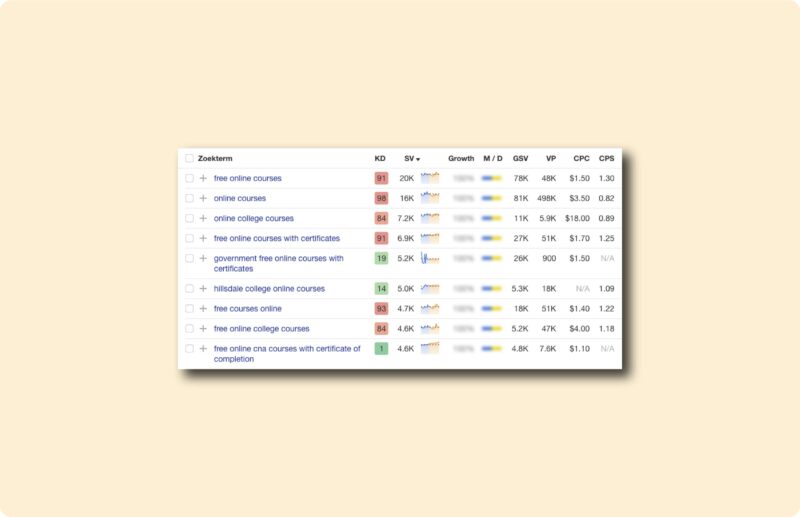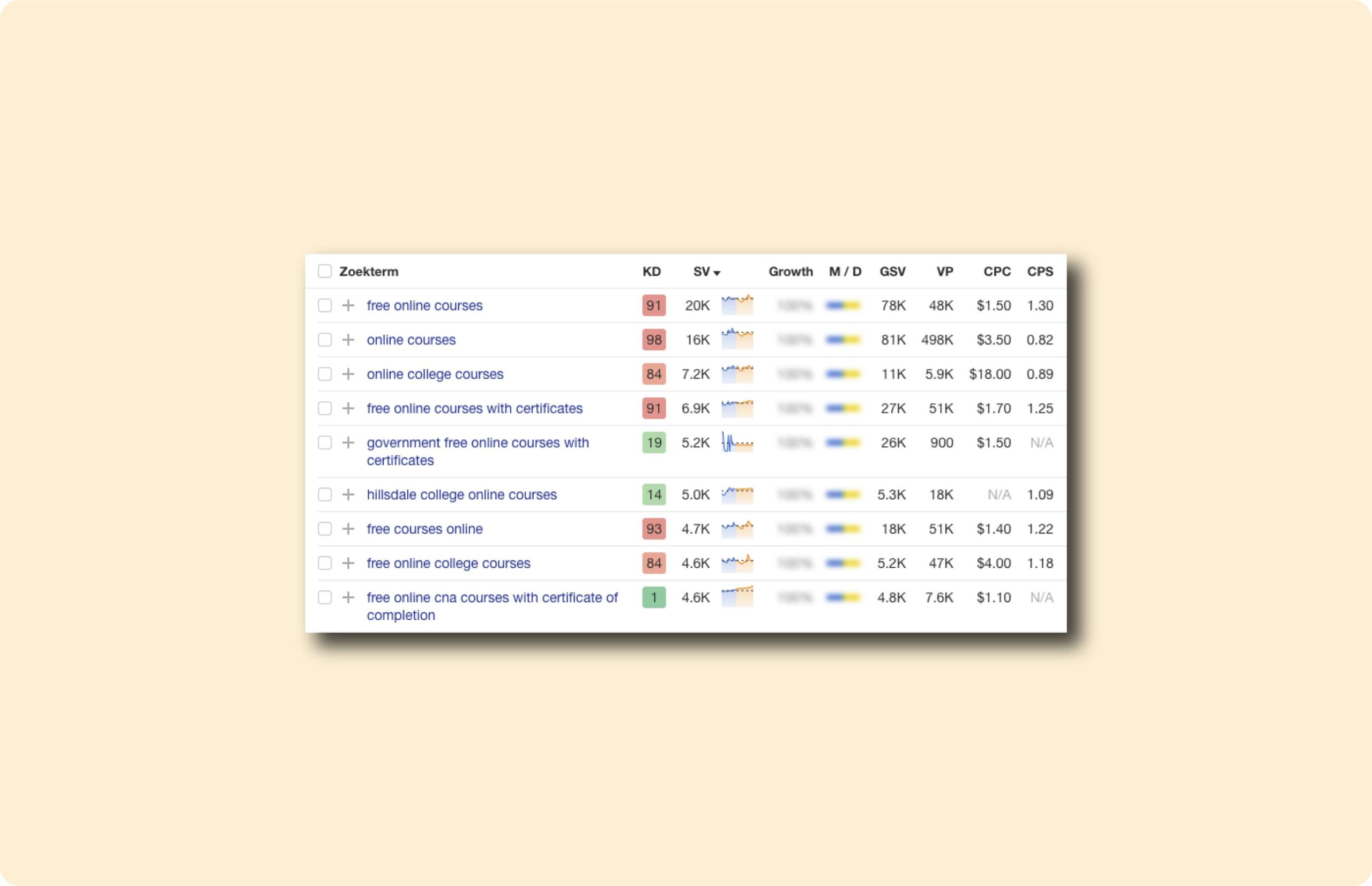SEO for online courses

With the growth of e-learning and online courses, competition has become fierce. It is no longer enough to simply put a course online and wait for students to flood in. You need to make sure your course is visible to people who are specifically looking for the knowledge you offer. This is where SEO for online courses plays a crucial role. In this article, I discuss targeted SEO strategies to make your online course findable, attract more students and ultimately increase your revenue.
Why optimize SEO for online courses
In the competitive world of online courses, SEO can make the difference between invisibility and success. SEO helps your course become more visible in search engines such as Google, leading to more organic traffic and potential students.
Since online courses often appeal to a specific audience, a well-executed SEO strategy can ensure that your course reaches exactly those people who are looking for the knowledge you offer.
This is additionally interesting because SEO ensures a steady and predictable flow of new students. This allows you to fill courses relatively consistently.
Keyword research for online courses
Keyword research is an essential part of any SEO strategy, but for online courses you need to focus on specific keywords related to education, e-learning and skills. Some of the things I think about:
- Because people are often looking for specific courses, long-tail keywords are essential. Consider search terms such as “online course JavaScript for beginners” or “SEO training for marketing professionals.” These keywords typically have less competition and attract people who are closer to making a purchase decision.
- Add modifiers to your keywords, such as “education,” “training,” “course,” “class,” or “master class.” This helps increase search volume for your target audience.
- Use tools such as Ahrefs, SEMrush, or Google Keyword Planner to find out which keywords can potentially generate traffic. Analyze the competition on these keywords and determine where opportunities exist.
Some of the interesting keywords for online courses can be found in the image below.

Optimize your landing pages
The landing page of your online course is where you need to convince both search engines and potential students of the value of your course.
- Make sure your URLs, title tags and meta-descriptions are optimized for your target keywords. For example, instead of “/course123,” use “/course-online-marketing-beginners.”
- In addition to SEO, your landing page should also be optimized for conversions. Use clear and powerful CTAs that prompt users to take action, such as “Start learning now” or “Sign up today.”
- Provide a detailed description of your course, including what students will learn, what skills they will develop, and who the course is appropriate for. Use your target keywords in this, but make sure the text remains appealing to users as well.
- Give visitors insight into what to expect by providing an overview of course content or access to a preview of the first lesson.
Content marketing for online courses
Content marketing can be a powerful way to promote your online course and attract more traffic to your website. This involves creating valuable content that responds to the questions and interests of your target audience.
- Blog about related topics: Write blog posts that are related to the content of your course. For example, if you offer a course on digital marketing, you can blog about SEO tips, social media strategies or online advertising. Make sure your blogs are SEO-optimized and that they link to your course pages.
- FAQ pages: Add a comprehensive FAQ section to your website, answering frequently asked questions about your course. This not only helps potential students, but can also improve search engine optimization by targeting specific searches with long keywords.
- Guides and E-books: Offer valuable guides and e-books as lead magnets in exchange for email addresses. This helps you build your mailing list, which can lead to future course enrollments.
Video is of additional importance
Videos are playing an increasing role in SEO, especially in the educational sector. People are often looking for visual content to learn, and by incorporating videos into your SEO strategy, you can promote your online course even better.
- YouTube optimization: Post short promotional videos or previews of your course on YouTube and optimize them for relevant keywords. Don’t forget to add links to your course page in the video description.
- Videos on your website: Integrate videos directly on your landing pages or blog posts. This can help keep visitors on your website longer, which positively impacts your search engine rankings.
Everything you do with video will also factor into regular results. Rich media, in practice, often provides a better user experience, which creates positive user signals.

Technical SEO for online learning platforms
Technical SEO is the foundation of a well-performing website. It is equally important for online courses, as your site must be fast, accessible and well-structured.
- Load speed: Optimize the speed of your website to ensure that your pages load quickly, especially if you host videos or other heavy content.
- Mobile friendliness: Make sure your website is mobile-friendly, as many students take courses via their smartphones. Use responsive design to provide a seamless experience across devices.
- Structured data: Use structured data such as Schema Markup to make your courses more visible in search engines and eligible for rich snippets.
Also make sure you handle the learning environment properly (when using an online learning environment). For this, I would usually recommend a subdomain that you can easily keep out of the index. For example, I have learning environment.ralfvanveen.com for my SEO course. This way I can easily keep it out of the index while using a separate CMS for this part of the website (an LMS in this case).
Local SEO for physical training
If you offer online courses that include physical components, such as workshops or meetings, local SEO is important.
- Optimize Google My Business: Add your course location to Google My Business and be sure to complete all details, such as opening hours and contact information.
- Local keywords: Use local keywords in your content and meta tags to attract people specifically looking for training in their area.
One tip is to set up the training locations (if this is allowed/could be done) as Google My Business locations. This way you can become much more widely findable.
Reviews are always important
Reviews and testimonials play an important role in convincing potential students. They can also help your SEO strategy by improving your credibility and trust.
- Collect and promote reviews: Encourage students to leave reviews on platforms such as Google, Trustpilot, or your own website. Use these reviews to enhance the reputation of your course.
- Rich snippets for reviews: Implement structured data for reviews to ensure that your course may appear in search results with star ratings, which can improve visibility and CTR.
I can almost guarantee that every student who actually gets started with an online course also goes through the reviews. To do this, I recommend putting in as many reviews sitewide as possible, but also giving each course the ability to leave specific reviews (only do this if you can get enough reviews per course).
If teaching courses is a separate part of your organization then it is best to collect reviews separately. I made that mistake with my reviews by lumping them all together, this creates confusion for the readers of the reviews.
Conclusion
SEO for online courses requires a focused approach that focuses on understanding the needs of your target audience, optimizing your landing pages and content, and employing technical SEO principles effectively. By combining smart keyword research, strong content and visual elements such as videos with solid technical optimizations, you can ensure that your course is highly visible in search engines. This leads to more traffic, more enrollments, and ultimately more success for your online course.






